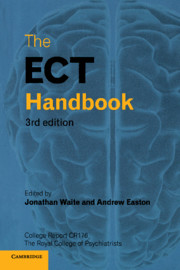Book contents
- Frontmatter
- Contents
- Abbreviations
- List of figures, tables and boxes
- List of contributors
- Preface
- Introduction: the role of ECT in contemporary psychiatry: Royal College of Psychiatrists’ Special Committee on ECT and Related Treatments
- 1 Mechanism of action of ECT
- 2 The ECT suite
- 3 Anaesthesia for ECT
- 4 ECT prescribing and practice
- 5 Psychotropic drug treatment during and after ECT
- 6 Monitoring a course of ECT
- 7 Non-cognitive adverse effects of ECT
- 8 Cognitive adverse effects of ECT
- 9 Dental issues related to ECT
- 10 Training, supervision and professional development: achieving competency
- 11 Nursing guidelines for ECT
- 12 Inspection of ECT clinics
- 13 Other brain stimulation treatments
- 14 The use of ECT in the treatment of depression
- 15 The use of ECT in the treatment of mania
- 16 The use of ECT in the treatment of schizophrenia and catatonia
- 17 The use of ECT in neuropsychiatric disorders
- 18 The use of ECT in people with intellectual disability
- 19 Safe ECT practice in people with a physical illness
- 20 ECT for older adults
- 21 The use of ECT as continuation or maintenance treatment
- 22 Consent, capacity and the law
- 23 Patients’ and carers’ perspectives on ECT
- Appendix I Out-patient declaration form
- Appendix II ECT competencies for doctors
- Appendix III Example of a job description for an ECT nurse specialist
- Appendix IV Example of a job description for an ECT nurse/ECT coordinator
- Appendix V Information for patients and carers
- Appendix VI Example of a consent form
- Appendix VII Useful contacts
- Appendix VIII Example of a certificate of incapacity
- Index
22 - Consent, capacity and the law
Published online by Cambridge University Press: 02 January 2018
- Frontmatter
- Contents
- Abbreviations
- List of figures, tables and boxes
- List of contributors
- Preface
- Introduction: the role of ECT in contemporary psychiatry: Royal College of Psychiatrists’ Special Committee on ECT and Related Treatments
- 1 Mechanism of action of ECT
- 2 The ECT suite
- 3 Anaesthesia for ECT
- 4 ECT prescribing and practice
- 5 Psychotropic drug treatment during and after ECT
- 6 Monitoring a course of ECT
- 7 Non-cognitive adverse effects of ECT
- 8 Cognitive adverse effects of ECT
- 9 Dental issues related to ECT
- 10 Training, supervision and professional development: achieving competency
- 11 Nursing guidelines for ECT
- 12 Inspection of ECT clinics
- 13 Other brain stimulation treatments
- 14 The use of ECT in the treatment of depression
- 15 The use of ECT in the treatment of mania
- 16 The use of ECT in the treatment of schizophrenia and catatonia
- 17 The use of ECT in neuropsychiatric disorders
- 18 The use of ECT in people with intellectual disability
- 19 Safe ECT practice in people with a physical illness
- 20 ECT for older adults
- 21 The use of ECT as continuation or maintenance treatment
- 22 Consent, capacity and the law
- 23 Patients’ and carers’ perspectives on ECT
- Appendix I Out-patient declaration form
- Appendix II ECT competencies for doctors
- Appendix III Example of a job description for an ECT nurse specialist
- Appendix IV Example of a job description for an ECT nurse/ECT coordinator
- Appendix V Information for patients and carers
- Appendix VI Example of a consent form
- Appendix VII Useful contacts
- Appendix VIII Example of a certificate of incapacity
- Index
Summary
All medical procedures, be they therapeutic or investigative, touch on the issue of consent – that is a measure of willingness on the part of the patient to undertake the procedure proposed. In this, ECT is no different to other therapeutic interventions. However, ECT has a particular status both within psychiatry and within the law that makes specific discussion of issues with regard to consent necessary.
General issues regarding consent
Electroconvulsive therapy is unusual in that consent obtained is for a course of treatments rather than for an individual procedure. It is also customary that the person seeking the consent will not be the person giving the treatment. The fact that the person receiving treatment has a psychiatric disorder sufficiently severe for ECT to be considered raises questions about their capacity; this makes it particularly important that consent is properly obtained and valid. It is unlawful and unethical to treat a patient who is capable of understanding the nature of any procedure, its purpose and implications, the anticipated benefits and any reasonably foreseeable adverse effects without first explaining it. The patient must then agree. Even if patients choose not to be informed of the full details of their diagnosis and treatment, they must be given the option of receiving this information. Guidance on good practice in consent can be found in publications from the Department of Health in England and Wales (2009), the Department of Health, Social Services and Public Safety in Northern Ireland (2003) and the Scottish Executive (2006), as well as from the General Medical Council (2008).
Obtaining valid consent should be considered a process rather than an event and it is necessary for patients to be given an adequate length of time to consider the benefits and drawbacks of the proposed treatment before making an informed decision. Patients should be informed of the risks and unwanted effects of ECT (Chapters 7–9) and they need to realise that a general anaesthetic is involved. If there are specific anaesthetic risks, the anaesthetist should explain these and obtain the necessary consent.
- Type
- Chapter
- Information
- The ECT Handbook , pp. 204 - 223Publisher: Royal College of PsychiatristsPrint publication year: 2013



